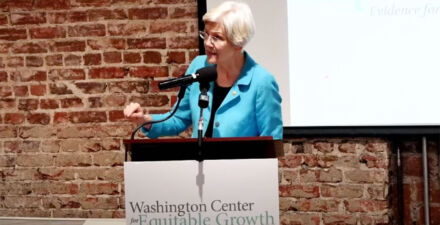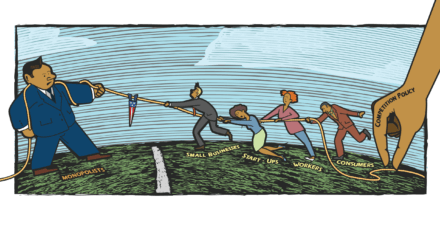Overview
Equitable Growth in Conversation is a recurring series where we talk with economists and other academics to help us better understand whether and how economic inequality affects economic growth and stability. In this installment, Michael Linden, senior policy fellow at the Washington Center for Equitable Growth, speaks with Natalie Foster, a senior fellow at the Aspen Institute’s future of work initiative in its economic opportunities program, as well as president and co-founder of the Economic Security Project, a collaboration of academics, activists, entrepreneurs, and philanthropists who champion direct cash payments to Americans to empower them to live and work to their full potential. In their conversation, Linden and Foster discuss:
- How the U.S. economy actually works for U.S. workers and their families
- The myths about trade-offs between economic growth and reducing inequality
- The role of longstanding and more recent government guarantees in U.S. economic growth and prosperity
- How successful but temporary government guarantees enacted amid the COVID-19 pandemic prove that policymakers can build a “guarantee economy”
- Whether basic income guarantees and other guarantee-support programs for U.S. workers and their families are practical
- The individuals who inspired Foster to write her new book
- How to overcome the divide-and-conquer, trickle-down economic narrative and replace it with multiracial solidarity to foster economic growth and prosperity
Michael Linden: It’s a real pleasure to get to talk to you about your new book, The Guarantee: Inside the Fight for America’s Next Economy. How has the book tour been going?
Natalie Foster: It has been so inspiring, and a bit overwhelming, to get to be in conversations with people all over this country about what the purpose of the economy is and how we could think about it differently. It’s so clear to me that we’re in a period of transition, and something big and new is needed. So, it’s been really lovely to get to speak to people all over the country.
How the U.S. economy actually works for U.S. workers and their families
Linden: Well, that’s a good place to start. Your book, first of all, is fantastic. I actually saw you last night at a dinner, and I told you how much I loved your book. And I’m so excited that we get to talk about it.
I want to start with a big, bold question about how the U.S. economy actually works. I feel like your book touches on the way that most economic policymakers have seen how it worked for the past 30 or 40 years. And your book really offers a new vision of that. I’m wondering if you could just speak a little bit about the new vision that you are articulating in your book.
Foster: Yeah. It’s such an honor to have you read it and tell me your thoughts. I really appreciate that.
I have been really inspired by a question that [The New School economist] Darrick Hamilton is fond of asking, and that is, what is the purpose of the economy? It’s such a simple question, and I’ve heard him ask it in rooms of economists, and there isn’t always an answer readily available. He argues, and I very much agree, that the purpose of the economy should be human flourishing. That’s what we should orient toward.
So, that’s what I’m trying to grapple with in The Guarantee. I lay out the past 45 years of economic orthodoxy that I think can be summed up by three tenets: total faith in the market, zero faith in government, and people left pulling themselves up by their bootstraps. We can call that trickle-down economics or neoliberalism. It was quite pervasive for my lifetime, and it left us broke and in debt, and left people stressed out and our democracy on the brink. It did not offer widespread prosperity.
I think the next 45 years of economic policymaking in a post-neoliberal policy world should be about guaranteeing the good life. I call that the “guarantee economy,” one where we have our needs met. Unlike the scarcity-obsessed thinking that’s marked the past 45 years, this guarantee economy would guarantee a floor that allows us all to build lives of dignity, agency, and presence, with the ability to spend time with those we love. The government has a role in making that happen.
That’s my vision for the richest nation on earth. Why wouldn’t we want an economy that guarantees we have what we need to thrive?
The myths about trade-offs between economic growth and reducing inequality
Linden: You just mentioned these three myths that dominated economic thinking for the past 45 years. And I wonder if there is a fourth one, or maybe it’s just a corollary to those three. Basically, you can either have growth and prosperity, or you can have less inequality. You can have a growing economy or a more equal society—you can’t have both. And any efforts that we do to make things more equal or, in your words, to guarantee a floor above which everybody can prosper or flourish mean that, by necessity, we will lose something else. We will lose growth. There was this perceived trade-off between growth and equality.
Certainly here at Equitable Growth, we spend a lot of time investigating that exact trade-off and finding that it doesn’t really exist. This is an important finding. I know that people will read your book and think, “Well, that all sounds good, but isn’t it going to be bad for growth? Aren’t we going to lose something if we guarantee that minimum floor, if we guarantee all of these things?”
Can you have guarantees and have good growth as well?
Foster: I think guarantees are crucial to growth. First, I’ll say that guarantees right now make capitalism work. We have patent rights, the court system, and shareholder liability protections. We have all these guarantees in place. I’m arguing we should extend them to everyday people who make the economy work.
The other metaphor that’s been helpful is one that venture capitalist Roy Bahat introduced, re-framing the idea of a net as a trampoline. And he actually calls it “trampoline capitalism,” which pushes people right back up when they have the security and the guarantee of stability in their lives. And we see that happening over and over.
For decades, small business creation has declined in the United States as corporate concentration has become more and more significant and, frankly, as people have had to work two and three jobs just to keep food on the table. But during the COVID-19 pandemic, when we sent people stimulus checks, when we passed the expanded Child Tax Credit, when people were enrolled in healthcare programs such as Medicaid that guaranteed healthcare, we saw that small business trend reverse. New small business formation went up 24 percent as people started their own businesses.
That dynamic mirrors what we’ve seen just with the guarantee of income in some of these pilot programs that are playing out around the country. When people have money in their pockets and security, they’re able to take more of a risk, either finding full-time employment or starting their own thing.
So, that’s my sense. But, Michael, you’ve lived this inside the government, both as a staffer on the Hill and now, most recently, in the White House Office of Management and Budget. And certainly, the Washington Center for Equitable Growth has really shaped my thinking in breaking the binary argument between growth and prosperity. I would love to hear your thoughts on this and what you say to people who say “No, there has to be a trade-off.”
Linden: I think you make a very persuasive case. I love the point you just made, which was that we do guarantees all the time—for some people. We’ve recognized that there are areas of our economy and our society where it’s very important for the government, for the public sector, to provide some guardrails, some basic guarantees that things won’t go completely off the rails in one direction or the other.
And you mentioned a bunch of them, including intellectual property and property rights and limited liability for corporations. We do that because it’s good for the economic business of the country. And the same logic applies to, as you put it, the real engines of growth and prosperity, which are everyday people.
We have a lot of recent economic evidence for this. When policymakers focus on everyday people, regular workers, regular communities all over the country, and ask what kind of guarantees they need and what kind of guardrails they need to thrive, then the U.S. economy as a whole does better, and we all do better. So, I certainly think that that supposed trade-off between inequality and growth is false.
I also think the point you just made about extending the logic of guarantees that we already use in some cases for some people—typically wealthy people, typically people who already have a lot—to everybody else is really smart, and it makes a lot of sense.
Foster: I also think the idea that opportunity and ingenuity can be more evenly distributed really paints an inspiring picture for the future. [Harvard University economist] Raj Chetty talks about “lost Einsteins,” this idea that there’s so much brilliance out there that is being squandered because of the lack of opportunity and security to pursue that brilliance. And that there would be just an era of inspired growth in the future by investing in these everyday engines that make the economy work is a future I want to live in.
The role of longstanding and more recent government guarantees in the U.S. economic growth and prosperity
Linden: Absolutely. And I think it’s interesting to note that we do have some guarantees in our public policy apparatus for everyday people already. We guarantee public education from Kindergarten through 12th grade, we have some form of a guarantee in terms of Social Security for retirement security. It’s probably not as strong a guarantee as we want, and certainly there are people trying to undermine that guarantee, but the basic concept is there. What are the lessons you’ve drawn from those existing guarantees that we have, and how do you want to apply them? How could those be applied to other areas of our life?
Foster: One lesson I’ve drawn is how those guarantees came to be. They didn’t always exist, and yet they were fought for and won. I actually find that to be inspiring. Consider Social Security, the 8-hour workday, the 40-hour workweek, the minimum wage, the fact that kids shouldn’t work in factories. All of these ideas were not once how the U.S. economy functioned at all but through a lot of blood and sweat and tears became the norms of how we work today. And we can’t really imagine life without those things. That’s why I think we should be hopeful there can be new guarantees created in this multiracial democratic project that we’re all part of.
Linden: You mentioned just a moment ago the success that we had during the pandemic of extending some real groundbreaking aid, help, guarantees, foundational supports, to a very wide array of people in this country. I think you said correctly that one of the things we can learn from that experience is that it really worked. It really provided that comfort to take a risk, to try something new. It got people through a very difficult moment. And we know from the economic data that almost everybody—not everybody, but many, many people—are better off today than they were before the pandemic, in part because of these interventions.
As you noted earlier, I was in the government at that time. One of the things that struck me was how quickly Congress pivoted after the COVID-19 recession ended and as the pandemic abated, trying to curtail those supports, those guarantees, and to limit them, to call them temporary, and to say, “Well, we were never intending those things to be permanent.” How do you think about that kind of backlash that we experienced in Congress against extending some of these things, making some of these things more permanent fixtures of our policy regime?
Foster: It was as though the government was fearful of doing too little instead of doing too much. And that was a real shift in how we tend to operate. Just to name a few of the things we saw, there was a historic eviction moratorium that held people safe in their homes, we gave people rental and mortgage assistance to make sure they could stay in their homes. And then, we did really big things, such as buying hotels and moving in the unhoused and giving people a key to a room of their own. It was like man-on-the-moon-style thinking applied to the housing crisis, and that got us closer to a housing guarantee.
On the healthcare front, the government actually mobilized the National Guard to put free vaccines in people’s arms. We mailed free tests, and we registered the lowest number of uninsured Americans at any point in history, thanks to the expansion of Medicaid. As millions of people lost their job overnight in this country, it would have once meant you also lost your healthcare, and it no longer did.
And on the income guarantee front, we passed the expanded Child Tax Credit, we sent every parent a check for 6 months, and that, plus the stimulus checks and the Unemployment Insurance, resulted in the lowest poverty numbers since we’ve been recording poverty in this country. We know that it cut child poverty in half. So, all of these things were decisions that we made, and they worked. We did these things right here in the United States of America. These were all things that I was told were impossible to do, partly because they flew in the face of the past 50 years of economic policymaking.
Now, many of these guarantees have been rolled back, as you said, and some of them were always temporary. But what’s important is that we did it. It’s proof we can and, in fact, our economic recovery has been better than many other similarly wealthy countries because we invested so heavily in families in this country.
How successful but temporary government guarantees enacted amid the COVID-19 pandemic prove policymakers can build a “guarantee economy”
Linden: I think that’s a great point, and I do think it’s an underappreciated point that the United States still has so much more progress to make, and there’s so many people who still need help, and it’s also true that we have had the strongest recovery of any other country in the world, and people are largely better off than they were prior to the pandemic. And that is a testament to the interventions that you’re talking about—these big, bold, sweeping interventions that really made people much, much better off.
I love the point you just made about the U.S. economy losing 20 million jobs in one month, just 4 years ago. And if that had happened without the government interventions that we made, then people would have lost their health insurance, they would have lost their homes, their savings. And that didn’t happen because we decided, no, we’re going to guarantee that people get through this pandemic no worse off than they were before, and in many cases, better off.
But it’s notable that that did not translate into a permanent change in our policy toward many of these things. There are some members of Congress who wanted to do so, but not enough. So, does it worry you that Congress was not willing to make the Child Tax Credit permanent, for example? Or extend funding for child care?
Foster: Yet, Michael, yet. The operative word here is yet because I believe this is exactly the fight that we are in now. Political calculations were made on programs such as the expanded Child Tax Credit. You’d have an entirety of one party, save one man, that would vote for it, and the entirety of another party that wouldn’t.
Since then, however, we have seen blue states and red states and purple states all pass the expanded Child Tax Credit at the state level. We have seen cities—small towns and big cities—across this country, where forward-looking mayors have launched demonstrations of guaranteed income, which is essentially the expanded Child Tax Credit. So, the momentum is building. We’ll get there.
And here’s the thing. Voters are there, right? The recent Times/Siena polling that came out in The New York Times in May 2024, so several months out from one of the most important elections of our lives, showed that nearly 70 percent of voters say that the country’s political and economic systems need major changes. And, in particular, young voters and Black and Hispanic voters, all of whom usually represent the foundation of any Democratic path to the presidency, want fundamental changes to U.S. society.
The good news is we have a blueprint for this. And things that were once understood to be impossible have now happened. And it’s just the beginning, it’s just the floor. The ceiling is very far away. Or, let me say it differently, the ceiling is what’s still decades from being built. So, I think that we should take heart in the blueprint we now have and go bigger.
At the same time, it’s important to understand who stands in the way. Next year, there will be a big tax fight that I know you are thinking about, and many others are thinking about, as provisions of the Tax Cuts and Jobs Act of 2017 expire. It will be very important that corporations that have done very well in this country pay their fair share, and that the ultra-wealthy who’ve done very well in this country pay their fair share. That is the fight that Americans want to see.
How realistic are basic income guarantees and other guarantee-support programs for U.S. workers and their families
Linden: That’s a great transition to the next question I had. There will be people who say “This all sounds great, but can we really do all of this? Can we really guarantee a basic income, housing, a good job, healthcare, a decent education, child care, retirement security? Can we do all of that? Isn’t that unrealistic? How are we going to pay for it all?” You’re going to hear that. I’m sure you’ve heard that a million times. And you’ve sort of hinted at the answer already. But I wonder if you could talk about how you think about that question? Can we really do all of this? Isn’t this just too much?
Foster: I’m offering a framework that says we can and should extend the guarantees to everyday Americans who make this economy work. What guarantees, and how, will be the political fight, but that we should start with the “should” and then get to the “how” question. Our nation always finds money to support what this nation decides is important. And there is no shortage of great ideas sitting on the shelf at think tanks across the country of how we would rebalance the tax code so that we can fund public goods.
A financial transaction tax, for example, a small fee on high-frequency trading, would result in billions of dollars in government revenue. There are so many good ideas like that. And there are very simple ones, such as making sure that the ultra-wealthy pay their fair share, they frankly pay what their executive assistants pay in taxes.
Right now, our tax code is so upside down that 23 of the largest corporations paid zero dollars in taxes over the past 5 years, and they reaped $130 billion in profits. That is not sustainable.
Linden: I think that’s right. I think there’s sort of two important ingredients here, and we’ve talked about both of them. One is that policymakers can rebalance our tax code so that it is generating the resources that we need to invest in the kinds of things that we know are going to be good for regular people. And, as we talked about earlier, those very same things are good for the overall U.S. economy, producing more growth, more prosperity, and more resources to go around, which makes this kind of a self-fulfilling cycle, a prosperity cycle.
I know that people are going to say “Can we do all of these things? Isn’t this just too much?” But I think the point that you’ve made in this conversation and in your book is that these are the kinds of things that lead to there being more to go around for everybody. There is not a trade-off. This is how we grow the pie.
Foster: Yes, this is how we grow the pie. I really like that.
The individuals who inspired Foster to write her new book
Linden: One of the things that I think is remarkable about your book, The Guarantee—and different from a similar book you could imagine, where you’re writing about the policy and the economics of all of this—is that you spend a lot of time in the book talking about the people, the people who advance these ideas and their stories, what drew them to these ideas, and what motivated them. If you could, just for the people reading this, tell us your favorite story. I think it would be really helpful for people to get a sense of who’s somebody that really inspired you to write this book, and who you think really exemplifies the story that you’re telling here?
Foster: This is so hard because there are people I knew well and got the great honor of fighting alongside, such as former Stockton, CA Mayor Michael Tubbs and Springboard for Opportunities CEO Aisha Nyandoro. And then, there are people who I watched from afar, such as Ady Barkan, who passed away right before I turned in the final manuscript but whose life was very inspiring to me and inspiring to millions of others as he fought for the healthcare guarantee. There are trailblazers such as Ai-jen Poo whose work with domestic workers laid the groundwork for the care guarantee, and Astra Taylor whose work organizing debtors makes a strong case for the guarantee of debt-free college, including canceling billions of dollars of student debt. And then, there’s people such as Tara Raghuveer, who have gone from building the Kansas City Tenants Union to now launching a federation of tenants’ unions around the country and really articulating the homes guarantee.
Here’s one of those stories: A young student sat in the Stanford University library, reading Dr. Martin Luther King Jr.’s last book, taking notes in the margin of his book. His name was Michael Tubbs. He took that dog-eared copy of Where Do We Go From Here: Chaos Or Community? to Stockton, California, when he became one of the youngest mayors in history. He decided to demonstrate the idea of a guaranteed income that Dr. King extensively wrote about in the last chapter, an idea that had gotten lost in the era of trickle-down economics. I met Mayor Tubbs around this time and the Economic Security Project, and I teamed up with Mayor Tubbs to launch the Stockton demonstration of guaranteed income.
Right around that time, Aisha Nyandoro sat with the women she served through her nonprofit, in Jackson, MS—Black women who live on the edges of the economy with all the precariousness that we know this modern economy creates. And she asked “What do you most need?” And the women just kept coming back to cash. So, she launched The Magnolia Mothers Trust, the longest-running guaranteed income demonstration in the United States, centering Black women.
And those two demonstrations, in Jackson, Mississippi and Stockton, California, open-sourced their playbook and invited others to join. Dozens of similar programs launched around the country. The media came and told the story of the participants and how their lives changed.
Suddenly, there were 30 cities, 50 cities, 60 cities, now 150 pilots demonstrating what monthly infusions of cash mean to families and communities across this country. And then, the pandemic hit. And Congress looked for tools lying around, ideas that had been tested and tried and true. Ideas such as monthly cash infusions. They passed the expanded Child Tax Credit. They mailed stimulus checks. They expanded Unemployment Insurance. These investments stood in contrast to the responses to previous economic crises in my lifetime.
Milton Friedman said “Only a crisis—actual or perceived—produces real change. When that crisis occurs, the actions that are taken depend on the ideas that are lying around.” Monthly cash infusions, starting in Jackson and Stockton, spreading to cities across the county, laid the groundwork to provoke this big idea of sending people money and to legitimize it as a tool of both stability and crisis aversion.
Linden: You’ve been talking to a lot of people about your book. You’ve been going all over the country. Is there one question that somebody’s asked you or one story somebody’s told you that really surprised you that you thought, “Well, that’s a good question, I need to have an answer for that question.”
Foster: Well, one of the questions I’ve really been pondering is also the question that [author and policy activist] Heather McGhee poses when she writes about “drained-pool politics,” and how there was a period of time when this country invested in public goods such as public pools. Those investments were mostly for White people. And as progress happened, as the civil rights movement moved forward and as integration happened, there were White racist politicians who would rather fill that public pool with gravel than have it be for everyone.
That same kind of White resistance today is one of the things holding us back from investing in public goods. So, how do we shift that, and how do we build multiracial solidarity that fights for what Heather calls the solidarity dividend, like economic guarantees?
The answers lie in both the head and the heart, in both the data and the stories that organizers who are on the ground in those communities can tell.
How to overcome the divide-and-conquer, trickle-down economic narrative and replace it with multiracial solidarity to foster economic growth and prosperity
Linden: It strikes me that there is a real financial interest in maybe stepping back thinking about who benefits from a society where we believe that the tax cuts for rich people trickle down to everybody, where the heroes of the economy are corporate CEOs and the shareholders of these giant multinational corporations who have an interest in making sure that everybody else is kind of pointing fingers at everybody else and not at them for the economy not working very well.
How much of the resistance that we run into, or that you run into, when you try to build that multiracial solidarity comes from people saying it would be really bad for the top 1 percent of Americans if everybody else looked around and said “Hey, we’re kind of all in this together.”
Foster: For so long, identity such as race and gender has been weaponized by those who stand to gain from a divided populace and have been weaponized to keep us apart, to point fingers and blame. Dog whistle politics, as [University of California, Berkeley public law professor] Ian Haney Lopez and Heather McGhee both talk about. I think the challenge is to name that, and build past it, to understand it’s been used against us and frankly keeps us from having the life we deserve in this country, and that we will all be better off if we come together in multiracial solidarity.
Linden: All this goes back, I think, a little bit to one of the myths that you talked about at the very beginning of our conversation, that the free market is infallible so just let the titans of industry and CEOs do what they do because government is inept. Don’t bother trying to use public resources to make things better. It’s up to individuals to pull themselves up by their bootstraps. Those myths put at the center of the story that what’s good for the people at the top is good for everybody else.
You mention in your book an idea that came from one of my colleagues, Janelle Jones, that we really should be measuring how the economy does by the people who are most often left behind, and if those folks are doing better, then that means we are all going to do better. And it really flips that story on its head and puts at the center of the U.S. economy those who have typically been left out and left behind. Demographically, that tends to be Black women. I wonder if you can talk a little bit about how that thinking plays into the guarantee economy?
Foster: I was really inspired by Janelle Jones’ work. She calls the framework “Black Women Best.” And it’s this idea, as you say, that we shouldn’t just look at the median workers’ pay or job numbers for the median worker. Let’s look at it for Black women. If they are doing well, if Black women’s pay is going up and employment numbers are going up, then we know everyone’s will be, too, and that is where we should orient our policymaking.
We should guarantee the floor required for a life of dignity and freedom to everyone in America, regardless of race, religion, or ZIP code. Not doing so has left our society, democracy, and the economy brittle. We should guarantee a floor for both moral reasons, as well as economic and democratic reasons.
Linden: I couldn’t agree more. It’s a part of your book and your argument that, as an economic policy wonk, really speaks to me, which is that the morality and the ethics of these proposals are crystal clear. And, as you said, if you ask the American people, they would agree. But we’ve just been told for so long that we can’t afford it or it’s not good for the economy. And that’s backwards. That’s the point you’re making, that there’s an economic case for this and there’s a moral case for this. And I love what you just said, that there’s a democratic case for this. It strengthens our society. The word you used was brittle. And I think that that really resonates with me, that if we could make our economy more resilient and our society more resilient with these guarantees, it would also make our democracy more resilient.
Foster: Which couldn’t be more important in this moment in time. The story of pulling yourself up by your bootstraps is one that means if we don’t make it in this economy, we feel shame and that it’s a personal failure. Even though the game is rigged, even though it is so clear that you’re betting against the house, which is not a good bet to make. The current economic story tells us any failure is our own fault, causing shame.
And when people feel shame, they can’t trust, and they aren’t operating out of a space of generosity, and thus are quicker to judge and point fingers. And that’s not a good place for democracy to flourish. People can’t trust each other or institutions. And you just see how it’s sort of a downward spiral. They have less democratic participation and then less of the economic pie, and it just continues to spiral down.
I want to usher in a spiral up, where people trust more, believe society owes them more and they owe society more, and therefore have a larger part of the economic pie and lean into democracy and democratic participation. And that is, I think, the upward spiral that the guarantees could offer democracy.
Linden: The virtuous circle of a guarantee economy.
Foster: Yes! Yes. Yes, that’s right.
Linden: Well, we are coming up on the end of our conversation, but this has been fantastic. I really want to say again how much I enjoyed your book and how thoughtful it was, what a nice, and unusual, weaving together of the economics, the storytelling, and the human aspects of the way we all engage in the world. And I hope everybody reads it, and I hope that the people making decisions read it.
Foster: Thanks. I’ve drawn so much from the scholarship from different work that the Washington Center for Equitable Growth has supported and created. And I appreciate having the intellectual groundwork that someone like me, who’s more of an advocate and organizer, can draw from in order to paint this picture.
Linden: We appreciate the opportunity to chat with you, and we thank you for that. And we’re looking forward to your next book.
Foster: Thank you.
Related
In Conversation with Raj Chetty
Explore the Equitable Growth network of experts around the country and get answers to today's most pressing questions!






